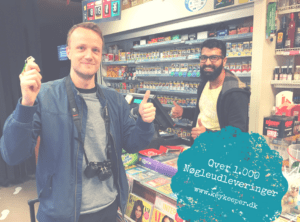News
Danish startup finding the key to success
This article is more than 8 years old.
KeyKeeper unlocking the doors of business with its key delivery service

Thumbs up all round for KeyKeeper (photo: KeyKeeper)
We’ve all been there. Needing to give someone a key, but not being able – or inclined – to meet that individual for some reason. As small as they are, keys can be a real nuisance at times.
But hark! Now there’s a solution to all your woeful key dilemmas. Danish startup KeyKeeper will allow you to pass on keys to your nosy mother-in-law, jilted ex-boyfriend or pesky Airbnb guest – without you even having to meet them. Now that’s a result!
It all works by the customer setting up an account on the KeyKeeper website and picking a shop or cafe that they wish to drop their key off at.
Then the delayed Airbnb guest, or friend arriving from abroad while the customer is at work, can simply pick up the key at the shop. When the key has been picked up by the guest, the customer receives a notification.
All it costs is a paltry 12.5 kroner, which is paid by the customer to the shop for holding the keys (KeyKeeper doesn’t take a fee from its customers yet, but expects to adjust this after this summer).
READ MORE: Danish butler startup riding high on the coattails of Airbnb
Nordic expansion
KeyKeeper was founded in late 2015 by its CEO, Christian Dehn, who came up with the concept when he asked his local kiosk to hold a key for an incoming Airbnb tenant that he was unable to meet with.
“Fortunately, the kiosk owner was super nice and helped me and afterwards I came to think that I was not the only one facing this issue – and that turned out to be the start of this adventure,” Dehn told CPH POST.
“I got the details sorted out and started developing the site in February 2016 and launched in August that year in Copenhagen in 25 shops. Today, we have over 1,000 users and facilitate hundreds of key deliveries every month.”
Dehn went on to reveal that KeyKeeper had made its way to Aarhus and Aalborg, while Odense and the rest of the Nordic region is also on the agenda.
As of now, KeyKeeper is only in Danish, but there are plans to offer an English version as well in the near future. Currently, 90 percent of KeyKeeper’s customers are Airbnb related, and the company does provide those booking a key pickup with information in English.











































